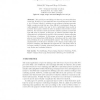Free Online Productivity Tools
i2Speak
i2Symbol
i2OCR
iTex2Img
iWeb2Print
iWeb2Shot
i2Type
iPdf2Split
iPdf2Merge
i2Bopomofo
i2Arabic
i2Style
i2Image
i2PDF
iLatex2Rtf
Sci2ools
117
click to vote
BPM
2009
Springer
2009
Springer
Understanding Spaghetti Models with Sequence Clustering for ProM
The goal of process mining is to discover process models from event logs. However, for processes that are not well structured and have a lot of diverse behavior, existing process mining techniques generate highly complex models that are often difficult to understand; these are called spaghetti models. One way to try to understand these models is to divide the log into clusters in order to analyze reduced sets of cases. However, the amount of noise and ad-hoc behavior present in real-world logs still poses a problem, as this type of behavior interferes with the clustering and complicates the models of the generated clusters, affecting the discovery of patterns. In this paper we present an approach that aims at overcoming these difficulties by extracting only the useful data and presenting it in an understandable manner. The solution has been implemented in ProM and is divided in two stages: preprocessing and sequence clustering. We illustrate the approach in a case study where it becom...
BPM 2009 | Business | Event Logs | Process Mining | Process Models |
Related Content
| Added | 25 May 2010 |
| Updated | 25 May 2010 |
| Type | Conference |
| Year | 2009 |
| Where | BPM |
| Authors | Gabriel M. Veiga, Diogo R. Ferreira |
Comments (0)

